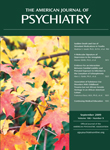Atypical Antipsychotic Augmentation in Major Depressive Disorder: A Meta-Analysis of Placebo-Controlled Randomized Trials
Abstract
Objective: The authors sought to determine by meta-analysis the efficacy and tolerability of adjunctive atypical antipsychotic agents in major depressive disorder. Method: Searches were conducted of MEDLINE/PubMed (1966 to January 2009), the Cochrane database, abstracts of major psychiatric meetings since 2000, and online trial registries. Manufacturers of atypical antipsychotic agents without online registries were contacted. Trials selected were acute-phase, parallel-group, double-blind controlled trials with random assignment to adjunctive atypical antipsychotic or placebo. Patients had nonpsychotic unipolar major depressive disorder that was resistant to prior antidepressant treatment. Response, remission, and discontinuation rates were either reported or obtained. Data were extracted by one author and checked by the second. Data included study design, number of patients, patient characteristics, methods of establishing treatment resistance, drug doses, duration of the adjunctive trial, depression scale used, response and remission rates, and discontinuation rates for any reason or for adverse events. Results: Sixteen trials with 3,480 patients were pooled using a fixed-effects meta-analysis. Adjunctive atypical antipsychotics were significantly more effective than placebo (response: odds ratio=1.69, 95% CI=1.46–1.95, z=7.00, N=16, p<0.00001; remission: odds ratio=2.00, 95% CI=1.69–2.37, z=8.03, N=16, p<0.00001). Mean odds ratios did not differ among the atypical agents and were not affected by trial duration or method of establishing treatment resistance. Discontinuation rates for adverse events were higher for atypical agents than for placebo (odds ratio=3.91, 95% CI=2.68–5.72, z=7.05, N=15, p<0.00001). Conclusions: Atypical antipsychotics are effective augmentation agents in major depressive disorder but are associated with an increased risk of discontinuation due to adverse events.



